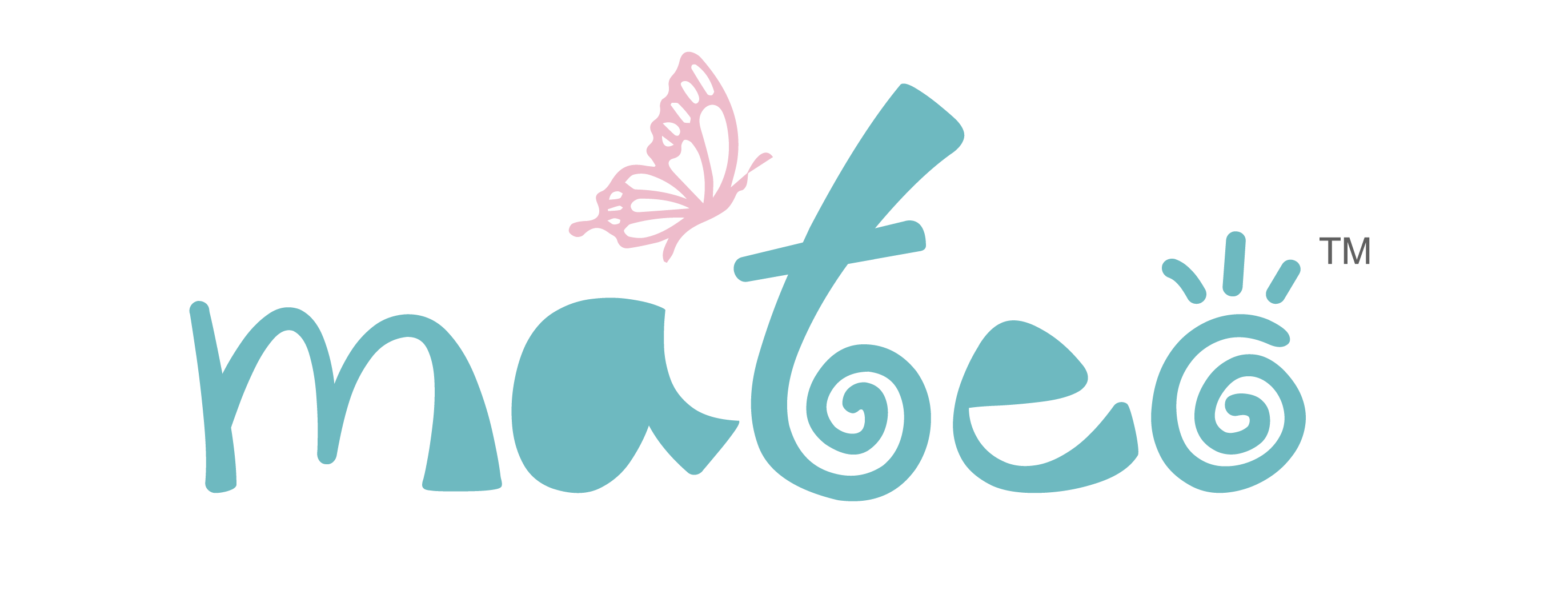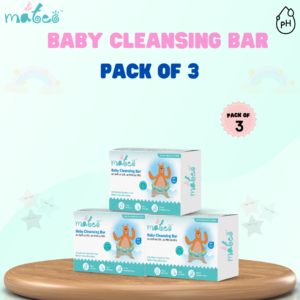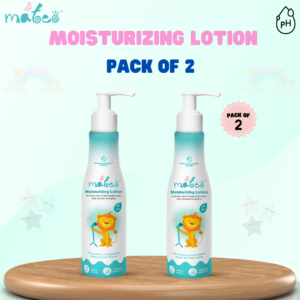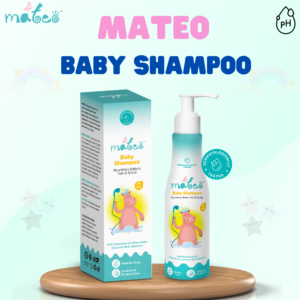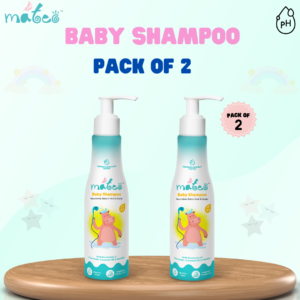
What is pH value and Significance of pH in babies?
Table of Content
- Concept Of pH Scale for Skin
- Significance of pH Value for Skin
- Why is pH value significant for babies?
- What is the pH Value of a Baby’s Skin?
- How to Maintain pH Balance in Baby Skin?
- Does pH for baby skin vary with temperature?
- Key Takeaway
Our skin performs a significant role in protecting our internal organs from the outside environment. It has a natural equilibrium that contributes to its overall health and functionality. It is essential to know about the pH scale of skin that contributes to its well-being.
Here in this article we define pH value and how it influences our healthy skin and pH levels in newborn babies. It also explains acidic pH range and its importance in skin.
Concept Of pH Scale for Skin
The acidity or alkalinity of the skin is indicated by its pH value. The pH of the skin’s surface is somewhat acidic, ranging from 4 to 6. The presence of sweat and sebum (skin oil) on the skin’s surface is chiefly responsible for its somewhat acidic character. These compounds contribute to the formation of an acidic environment, which is referred to as the acid mantle.
The acid mantle aids in the formation of a protective barrier on the skin’s surface. It is a defensive mechanism that keeps dangerous bacteria, fungi, and other germs from invading the skin. This barrier function is critical in minimizing the danger of infection and preserving the skin’s general health.
Significance of pH Value for Skin
The skin’s pH level influences its capacity to retain moisture, preventing dryness and ensuring appropriate hydration. Inadequate pH levels weaken the skin’s moisture barrier, resulting in dryness, tightness, and excess oiliness. High pH level in babies or pH imbalances or can cause skin problems such as acne and eczema. The pH of cleansing solutions can also affect the skin’s pH balance, with harsh or alkaline choices taking away natural oils. Maintaining a proper pH balance for baby skin is essential for good skin health, and seeing a dermatologist or skin care specialist may help.
Why is pH value significant for babies?
A baby’s skin pH is vital for its skin health, immunological system, digestive system, urinary tract health, and dental health.
A slightly acidic or low pH level in newborn from 4.5 to 6, forming a protective barrier against dangerous bacteria and promoting the microbiome’s health. It is always best to opt for baby care products with pH 5.5 and milk ingredients for your baby soft sensitive skin. pH imbalances can make the skin more prone to dryness, irritation, diaper rash, and other skin disorders.
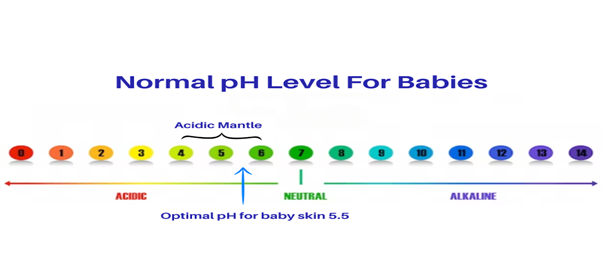
A balanced pH contributes to general immune function and defence against external assaults. A balanced urine pH reduces the incidence of urinary tract infections (UTIs) by inhibiting the development of certain bacteria.
A neutral pH in the oral cavity prevents tooth decay, particularly in babies who ingest sugary meals or liquids. Maintaining a good pH balance is critical for general health, comfort, and protection against various skin and health problems.
What is the pH Value of a Baby’s Skin?
The pH level of newborn skin usually is higher after birth, ranging between 6.0 and 7.0, and progressively drops to a more acidic level during the first few weeks. A low pH level implies excessive acidity, which can cause problems like dryness, sensitivity, or dermatitis. Harsh soaps, irritating exposure, and underlying skin disorders are all factors that contribute to low pH levels.
The pH range of baby skin is somewhat acidic, ranging from 4.5 to 5.5. Maintaining normal pH level in a newborn is critical for the skin’s natural protective barrier, moisture retention, microbial growth regulation, and general skin integrity. Consult a pediatrician or dermatologist for accurate diagnosis and treatment.
How to Maintain pH Balance in Baby Skin?
The skin’s pH value is critical in preserving its health and functioning. The skin’s slightly acidic pH helps the production of the protective acid mantle, which functions as a barrier against dangerous microorganisms and protects the skin’s general health. A regulated pH is essential for the skin’s capacity to retain moisture, avoid dryness, and promote hydration. pH abnormalities can cause acne and eczema, among other skin diseases.
- To keep a baby’s skin healthy, use soft, pH-balanced skincare products, minimize the bathing duration, and occasionally use mild, free-of-fragrance cleansers. After bathing, moisturize with a moderate, fragrance-free lotion, and use a baby-friendly washing detergent.
- Choose baby-safe, pH-balanced skincare products. Look for items that have a pH range suited for the baby’s skin. Avoid using harsh cleansers, fragrances, or anything containing harsh chemicals that might disturb the skin’s pH.
- Avoid excessive wiping during diaper changes, and clothing the infant in soft, breathable fabrics such as cotton. Maintain a hygienic atmosphere by regularly sanitizing and cleaning toys and changing mats and other surfaces.
Understand that every baby’s skin is unique, and finding the ideal skincare routine and products may need trial and error. For expert advice and guidance, see a pediatrician or dermatologist.
Does pH for baby skin vary with temperature?
The pH of baby skin is primarily influenced by its natural acid mantle, which is formed by sweat, sebum, and other factors. Temperature can indirectly affect the skin’s pH balance through other mechanisms, such as using lukewarm water for bathing and avoiding excessive sweating.
The primary factors influencing the pH of baby skin are,
- Skin’s natural acidity
- The use of appropriate skincare products.
Choosing gentle, pH-balanced skincare products, following proper hygiene practices, and maintaining a clean and dry environment are crucial for maintaining a healthy pH balance. Consulting a healthcare professional for guidance and advice is essential for maintaining a healthy pH balance in baby skin.
Key Takeaway
Because of their fragile and sensitive skin, keeping a good pH balance is especially crucial for newborns. Parents may assist in maintaining a healthy pH balance in their baby’s skin by using mild, pH-balanced skincare products, minimizing bathing time, moisturizing regularly, and practising appropriate hygiene.
Understanding and maintaining an appropriate pH balance is critical for general skin health, comfort, and protection. If there are specific problems or recurring skin conditions, it is best to get personalized assistance and advice from healthcare specialists.

Nivethitha Sridharan
Nivethitha is a mother of two children and has a great interest in writing as an experienced mother. She publishes educational and interesting articles on baby care and also assists parents in selecting the finest baby products for their baby’s skin and well-being. She focuses on infant skin care and health issues. She also provides suggestions and guidance on baby care and avoids common skin disorders in newborns. Nivethitha likes studying and writing about new and innovative ideas that might assist people in finding solutions to their problems. She feels that content writing is an effective means of communicating thoughts and information to the world.
-
Mateo Baby Cleansing Bar – 75gm (Pack of 3)
₹555.00Add to cart -
Mateo Baby Massage Oil – 100ml (Pack of 3)
₹585.00Add to cart -
Mateo Baby Moisturizing Lotion – 200ml (Pack of 2)
₹700.00Add to cart -
Mateo Baby Rashfree Cream – 60g (Pack of 3)
₹540.00Add to cart -
Mateo Baby Shampoo
₹395.00Add to cart -
Mateo Baby Shampoo – 200 ml (Pack of 2)
₹790.00Add to cart -
Mateo Baby Shampoo and Mateo Massage Oil(Combo Pack)
₹590.00Add to cart -
Mateo Baby Shampoo and Mateo Rashfree Cream(Combo Pack)
₹575.00Add to cart
